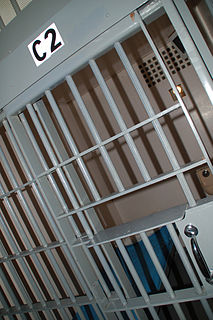Contempt of court, often referred to simply as "contempt", is the offense of being disobedient to or disrespectful toward a court of law and its officers in the form of behavior that opposes or defies the authority, justice and dignity of the court. A similar attitude towards a legislative body is termed contempt of Parliament or contempt of Congress.

Harvey v. Horan, 278 F. 3d 370 is a federal court case dealing with felons' rights of access to DNA testing. The Eastern Virginia District Court originally found that felons were entitled access to DNA testing on potentially exculpatory evidence, but this finding was later overturned by the Fourth Circuit Court of Appeals. Nevertheless, the case paved the way for the Innocence Protection Act, which ensures that convicted offenders can try to prove their innocence by requesting DNA testing on evidence in government's possession that was used in their case.

The Fifth and Fourteenth Amendments to the United States Constitution each contain a due process clause. Due process deals with the administration of justice and thus the due process clause acts as a safeguard from arbitrary denial of life, liberty, or property by the government outside the sanction of law. The Supreme Court of the United States interprets the clauses broadly, concluding that these clauses provide four protections: procedural due process, substantive due process, a prohibition against vague laws, and as the vehicle for the incorporation of the Bill of Rights.

The Guantanamo military commissions are military tribunals authorized by presidential order, then by the Military Commissions Act of 2006, and currently by the Military Commissions Act of 2009 for prosecuting detainees held in the United States Guantanamo Bay detainment camps.
Strickland v. Washington, 466 U.S. 668 (1984), was a landmark Supreme Court case that established the standard for determining when a criminal defendant's Sixth Amendment right to counsel is violated by that counsel's inadequate performance.
Greenholtz v. Inmates of the Nebraska Penal and Correctional Complex, 442 U.S. 1 (1979), was a United States Supreme Court case in which the Court held that when state law requires the state to grant parole whenever a prisoner satisfies certain conditions, due process requires the state to allow the prisoner to present evidence in support of his request for parole and to furnish a written explanation of the reasons why his request has been denied.
Superintendent v. Hill, 472 U.S. 445 (1985), was a United States Supreme Court case in which the Court held that due process required that prison disciplinary decisions to revoke good-time credits must be supported by "some evidence."
Cleveland Board of Education v. Loudermill, 470 U.S. 532 (1985), was a United States Supreme Court case in which the Court held that:
Nutraloaf is a food served in prisons in the United States and Canada to inmates who have misbehaved; for example, assaulting prison guards or fellow prisoners. It is similar to meatloaf in texture, but has a wider variety of ingredients. Prison loaf is usually bland, perhaps even unpleasant, but prison wardens argue that nutraloaf provides enough nutrition to keep prisoners healthy without requiring utensils to be issued.
Prison Legal News (PLN) is a monthly American magazine and online periodical published since May 1990. It primarily reports on criminal justice issues and prison and jail-related civil litigation, mainly in the United States. It is a project of the Human Rights Defense Center (HRDC), a 501(c)(3) non-profit organization.

Lesbian, gay, bisexual, and transgender (LGBT) prisoners often face additional challenges compared to non-LGBT prisoners. According to Just Detention International, LGBT inmates are "among the most vulnerable in the prison population". 67% of LGBT prisoners in California report being assaulted while in prison. The vulnerability of LGBT prisoners has led some prisons to separate them from other prisoners, while in others they are housed with the general population.
Marsy's Law, the California Victims' Bill of Rights Act of 2008, enacted by voters as Proposition 9 through the initiative process in the November 2008 general election, is an Amendment to the state's constitution and certain penal code sections. The act protects and expands the legal rights of victims of crime to include 17 rights in the judicial process, including the right to legal standing, protection from the defendant, notification of all court proceedings, and restitution, as well as granting parole boards far greater powers to deny inmates parole. Passage of this law in California has led to the passage of similar laws in Florida, Georgia, Illinois, Kentucky, Nevada, North Carolina, Oklahoma, and Ohio, and efforts to pass similar laws in Wisconsin, Hawaii, Iowa, Montana, Idaho, and South Dakota. In November 2017, Marsy's Law was found to be unconstitutional and void in its entirety by the Supreme Court of Montana for violating that State's procedure for amending the Montana Constitution.
Bounds v. Smith, 430 U.S. 817 (1977), was a United States Supreme Court case in which the Court tested the basic constitutional right of prison inmates’ access to legal documents prior to court. Prison authorities would consequently be required to provide legal assistance and counsel to inmates, whether it be through a trained legal professional or access to a legal library. Multiple prisoners alleged that they were denied access to the courts due to lack of an adequate legal library and assistance with court related documents.
Holt v. Hobbs, 574 U.S. ___ (2015), was an American legal case in which the Supreme Court unanimously ruled that an Arkansas prison policy which prohibited a Muslim prisoner from growing a short beard in accordance with his religious beliefs violated the Religious Land Use and Institutionalized Persons Act (RLUIPA).
In re Oliver, 333 U.S. 257 (1948), was a decision by the United States Supreme Court involving the application of the right of due process in state court proceedings. The Sixth Amendment in the Bill of Rights states that criminal prosecutions require the defendant "... to be informed of the nature and cause of the accusation...and to have the Assistance of Counsel for his defence." In this case, a witness in a Michigan grand jury hearing was convicted and sentenced to jail without either notice or attorney assistance.
Human Rights Defense Center is a non-profit 501(c)(3) organization that campaigns on behalf of prisoner rights across the United States. The organization advocates for the rights of people in "state and federal prisons, local jails, immigration detention centers, civil commitment facilities, Bureau of Indian Affairs jails, juvenile facilities and military prisons." Some of the major focuses of the Human Rights Defense Center (HRDC) include work on free speech issues, government transparency and accountability, as well as opposition to the private prison industry.

The August Rebellion refers to a 1974 riot at the Bedford Hills Correctional Facility for Women, a prison in Bedford Hills in the Town of Bedford, Westchester County, New York, United States. In August 1974, about 200 of these prisoners rioted, taking over parts of the prison, because of the inhumane treatment of one of the leaders among the prisoners, Carol Crooks.
Prisoner Law refers to litigation that determines the freedoms that a prisoner either holds or loses when they are incarcerated. This includes the end of the Hands- Off Doctrine and the ability to be protected by the First, Fourth, Eighth, and Fourteenth Amendments. Furthermore, prisoner laws regulate the ways in which individuals experience privacy in a prison setting. Important case laws have arisen through time that have either hindered or protected prisoners from certain rights. Some include the Hudson v. Palmer case which held that prisoners were not protected against searches and seizures of their prison cells and Wolff v. McDonnell that stated that prisoners shall remain entitled to some of their constitutional rights even after being incarcerated.
Hudson v. Palmer, 468 U.S. 517 (1984), is a United States Supreme Court case in which the Court held that prison inmates have no privacy rights in their cells protected by the Fourth Amendment to the United States Constitution. The Court also held that an intentional deprivation of property by a state employee "does not violate the Fourteenth Amendment if an adequate postdeprivation state remedy exists," extending Parratt v. Taylor to intentional torts.










